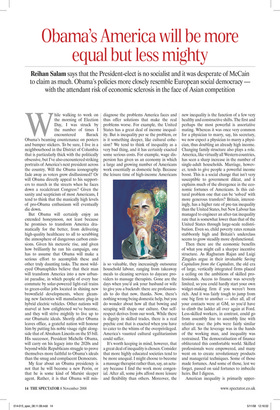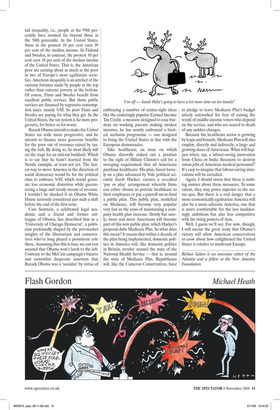Obama’s America will be more equal but less mighty
Reihan Salam says that the President-elect is no socialist and it was desperate of McCain to claim as much. Obama’s policies more closely resemble European social democracy — with the attendant risk of economic sclerosis in the face of Asian competition While walking to work on the morning of Election Day, I was struck by the number of times I encountered Barack Obama’s beaming countenance on posters and bumper stickers. To be sure, I live in a neighbourhood in the District of Columbia that is particularly thick with the politically obsessive, but I’ve also encountered striking portraits of America’s next president across the country. Will the Obama iconography fade away as voters grow disillusioned? Or will Obama directly appeal to his supporters to march in the streets when he faces down a recalcitrant Congress? Given the sanity and scepticism of most Americans, I tend to think that the manically high levels of pro-Obama enthusiasm will eventually die down.
But Obama will certainly enjoy an extended honeymoon, not least because he promises to transform America dramatically for the better, from delivering high-quality healthcare to all to scrubbing the atmosphere of dangerous carbon emissions. Given his meteoric rise, and given how brilliantly he ran his campaign, one has to assume that Obama will make a serious effort to accomplish these and other truly daunting tasks. The most wildeyed Obamaphiles believe that their man will transform America into a new urbanist paradise, in which people of every hue commute by solar-powered light-rail trains to green-collar jobs located in shining new brownfield developments, where gleaming new factories will manufacture plug-in hybrid electric vehicles. Other nations will marvel at how enlightened we’ve become, and they will strive mightily to live up to our Obamaite ideals. Shortly after Obama leaves office, a grateful nation will honour him by putting his noble visage right alongside that of Abraham Lincoln on the $5 bill. His successor, President Michelle Obama, will carry on his legacy into the 2020s and beyond while Republicans struggle to prove themselves more faithful to Obama’s ideals than the smug and complacent Democrats.
My fear about an Obama presidency is not that he will become a new Perón, or that he is some kind of Marxist sleeper agent. Rather, it is that Obama will mis diagnose the problems America faces and thus offer solutions that make the real problems worse. For example, the United States has a great deal of income inequality. But is inequality per se the problem, or is it something deeper, like cultural cohesion? We tend to think of inequality as a very bad thing, and it has certainly exacted some serious costs. For example, wage dispersion has given us an economy in which a large and growing number of Americans work essentially as domestic help. Because the leisure time of high-income Americans is so valuable, they increasingly outsource household labour, ranging from takeaway meals to cleaning services to daycare providers to massage therapists. Gone are the days when you’d ask your husband or wife to give you a backrub: there are professionals to do that now, thanks. Now, there’s nothing wrong being domestic help, but you do wonder about how all that bowing and scraping will shape our culture. Our selfrespect derives from our work. While there is dignity in skilled trades, there is a real psychic cost that is exacted when you have to cater to the whims of the overprivileged. America’s vaunted cultural egalitarianism could suffer.
It’s worth keeping in mind, however, that a great deal of inequality is chosen. Consider that more highly educated societies tend to be more unequal. I might choose to become a massage therapist rather than, say, an actuary because I find the work more congenial. After all, some jobs afford more leisure and flexibility than others. Moreover, the new inequality is the function of a few very healthy and constructive shifts. The first and perhaps the most powerful is assortative mating. Whereas it was once very common for a physician to marry, say, his secretary, we now expect a physician to marry a physician, thus doubling an already high income. Changing family structure also plays a role. America, like virtually all Western countries, has seen a sharp increase in the number of single-adult households. Marriage, however, tends to give people a powerful income boost. This is a social change that isn’t very susceptible to government diktat, and it explains much of the divergence in the economic fortunes of Americans. Is this cultural problem one that can be ‘solved’ with more generous transfers? Britain, interestingly, has a higher rate of pre-tax inequality than the United States, but New Labour has managed to engineer an after-tax inequality rate that is somewhat lower than that of the United States through large-scale redistribution. Even so, child poverty rates remain stubbornly high and Britain’s underclass seems to grow steadily more dysfunctional.
Then there are the economic benefits of what you might call a sharper incentive structure. As Raghuram Rajan and Luigi Zingales argue in their invaluable Saving Capitalism from the Capitalists, the old era of large, vertically integrated firms placed a ceiling on the ambitions of skilled professionals. Access to finance was severely limited, so you could hardly start your own widget-making firm if you weren’t born rich. And it was fairly tough to jump from one big firm to another — after all, all of your contacts were at GM, so you’d have to climb the ladder all over again at Ford. Less-skilled workers, in contrast, could go from assembly line to assembly line with relative ease: the jobs were fairly similar after all. So the leverage was in the hands of the working man, and inequality was restrained. The democratisation of finance obliterated this comfortable world. Skilled professionals were empowered, and many went on to create revolutionary products and managerial techniques. Some of those made fortunes. And some of those, lest we forget, passed on said fortunes to imbecile heirs. But I digress.
American inequality is primarily upper tail inequality, i.e., people at the 99th percentile have zoomed far beyond those at the 50th percentile. In the United States, those in the poorest 10 per cent earn 39 per cent of the median income. In Finland and Sweden, in contrast, the poorest 10 per cent earn 38 per cent of the median income of the United States. That is, the American poor are earning about as much as the poor in two of Europe’s most egalitarian societies. American inequality is an artefact of the extreme fortunes made by people at the top rather than extreme poverty at the bottom. Of course, Finns and Swedes benefit from excellent public services. But those public services are financed by regressive consumption taxes, mainly VAT. So poor Finns and Swedes are paying for what they get. In the United States, the tax system is far more progressive, for better or for worse.
Barack Obama intends to make the United States tax code more progressive, and he intends to finance more generous benefits for the poor out of revenues raised by taxing the rich. By doing so, he most likely will set the stage for an anti-tax backlash. Which is to say that he hasn’t learned from the Nordic example, at least not yet. The fastest way to move America in the direction of social democracy would be for the political class to embrace VAT, which would generate less economic distortion while guaranteeing a large and steady stream of revenue. I wouldn’t be shocked if an Obama White House seriously considered just such a shift before the end of the first term.
Cass Sunstein, a celebrated legal academic and a friend and former colleague of Obama, has described him as a ‘University of Chicago Democrat’, a politician profoundly shaped by the pro-market insights of the libertarians and conservatives who’ve long played a prominent role there. Assuming that this is true, we can rest assured that Obama won’t lurch to the left. Contrary to the McCain campaign’s bizarre and somewhat desperate assertion that Barack Obama was a ‘socialist’ by virtue of embracing a number of centre-right ideas like the enduringly popular Earned Income Tax Credit, a measure designed to ease burdens on working parents making modest incomes, he has mostly embraced a limited, meliorist programme — one designed to bring the United States in line with the European democracies.
Take healthcare, an issue on which Obama shrewdly staked out a position to the right of Hillary Clinton’s call for a sweeping requirement that all Americans purchase healthcare. His plan, based loosely on a plan advanced by Yale political scientist Jacob Hacker, creates a so-called ‘pay or play’ arrangement whereby firms can either choose to provide healthcare to their employees or pay a payroll tax to fund a public plan. This public plan, modelled on Medicare, will become very popular very fast as the costs of maintaining a company health plan increase. Slowly but surely, more and more Americans will become part of this new public plan, which Hacker’s proposal dubs Medicare Plus. So what does this mean? It means that within a decade of the plan being implemented, domestic politics in America will, like domestic politics in Britain, revolve around the state of the National Health Service — that is, around the state of Medicare Plus. Republicans will, like the Cameron Conservatives, have to pledge to leave Medicare Plus’s budget utterly untouched for fear of raising the wrath of middle-income voters who depend on the service, and who are scared to death of any sudden changes.
Because the healthcare sector is growing by leaps and bounds, Medicare Plus will also employ, directly and indirectly, a large and growing share of Americans. What will happen when, say, a labour-saving innovation from China or India threatens to destroy union jobs of American medical personnel? It’s easy to imagine that labour-saving innovations will be curtailed.
Again, I should stress that there is nothing sinister about these measures. To some extent, they may prove superior to the status quo. But there is a real danger that a more economically egalitarian America will also be a more sclerotic America, one that is more comfortable for the less maddeningly ambitious but also less competitive with the rising powers of Asia.
Well, I guess we’ll see. For now, though, I will savour the great irony that Obama’s victory will allow American conservatives to crow about how enlightened the United States is relative to intolerant Europe.
Reihan Salam is an associate editor of the Atlantic and a fellow at the New America Foundation.



















































































 Previous page
Previous page